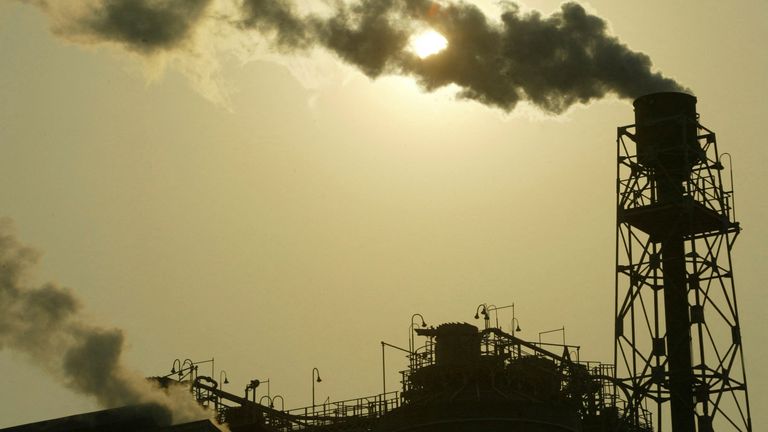The chance of limiting global warming to 1.5C is “virtually zero” on current trends, according to the UN’s environment body.
This year’s Emissions Gap Report finds that emissions of greenhouse gasses in 2023 were the highest on record.
More concerning, the rate of growth since 2022 was nearly twice as fast as in the decade preceding the COVID pandemic.
This comes despite decades of climate talks and a boom in wind and solar power.
The analysis finds that the current trajectory in carbon emissions puts the world on course for a potentially catastrophic 3.1C of warming this century – compared to pre-industrial times.
While emissions in many wealthy countries, including the UK, the US and the EU have peaked, they are not falling anywhere near fast enough to make up for rapidly growing emissions in places like China, India, Indonesia, Saudi Arabia and Vietnam.
‘Crunch time is here’
“Climate crunch time is here,” said Inger Andersen, executive director of the United Nations Environment Programme (UNEP).
“We need global mobilisation on a scale and pace never seen before – starting right now, before the next round of climate pledges.”
The report urges nations meeting at the UN climate summit next month in Baku, Azerbaijan, to come forward with emissions-cutting commitments that don’t continue to ignore the agreement they all signed in Paris in 2015.
The Paris Agreement, signed by 196 countries, pledged to limit global warming to well below 2C above pre-industrial levels and try and prevent it from rising beyond 1.5C.
The UNEP analysis of current carbon-cutting commitments finds only one country, Madagascar, has submitted a more ambitious one since last year.
And only a handful are ambitious enough to actually slow global warming.
If all current pledges were implemented in full the world would still warm by between 2.6C-2.8C this century.
Given many countries, including the UK, are yet to implement policies to fully meet their targets, the current trajectory takes the world closer to a potentially catastrophic 3.1C of warming.
“Central warming projections indicate that the chance of limiting global warming to 1.5C would be virtually zero,” the report concludes.
‘This is a battle we cannot afford to lose’
It’s not all bad news however.
An analysis of the cost of measures to reduce emissions finds there is technical potential for cuts of 31 gigatons of greenhouse gasses by 2030 – around half of the total emitted globally in 2023 – and 41 gigatons by 2035.
This “massive effort” to deploy zero-carbon electricity generation like wind and solar and reverse deforestation trends would bridge the gap needed to put the world back on track to keep warming below 1.5C.
However, years of inaction have made this challenge harder, the report finds.
Emission cuts must be 7.5% steeper every year until 2035 to meet 1.5C and 4% annually to keep to 2C.
“Maybe we won’t get all the way to 1.5C but 1.6C is a lot better than 1.7C,” says Dr Anne Olhoff, the report’s lead author.
“Basically, every fraction of a degree matters and this is a battle we cannot afford to lose.”
Countries have until 2025 to submit new carbon-cutting pledges under the Paris Agreement.
But to deliver the cuts required, the main challenge – and one that will be central to talks at the upcoming climate summit in Baku – is technical and financial assistance from rich countries to poorer ones that don’t bear historical responsibility for global warming.
Progress, says Dr Olhoff, “hinges on immediate and relentless action.”
“Most of all, of course, it depends on political leadership.”



























